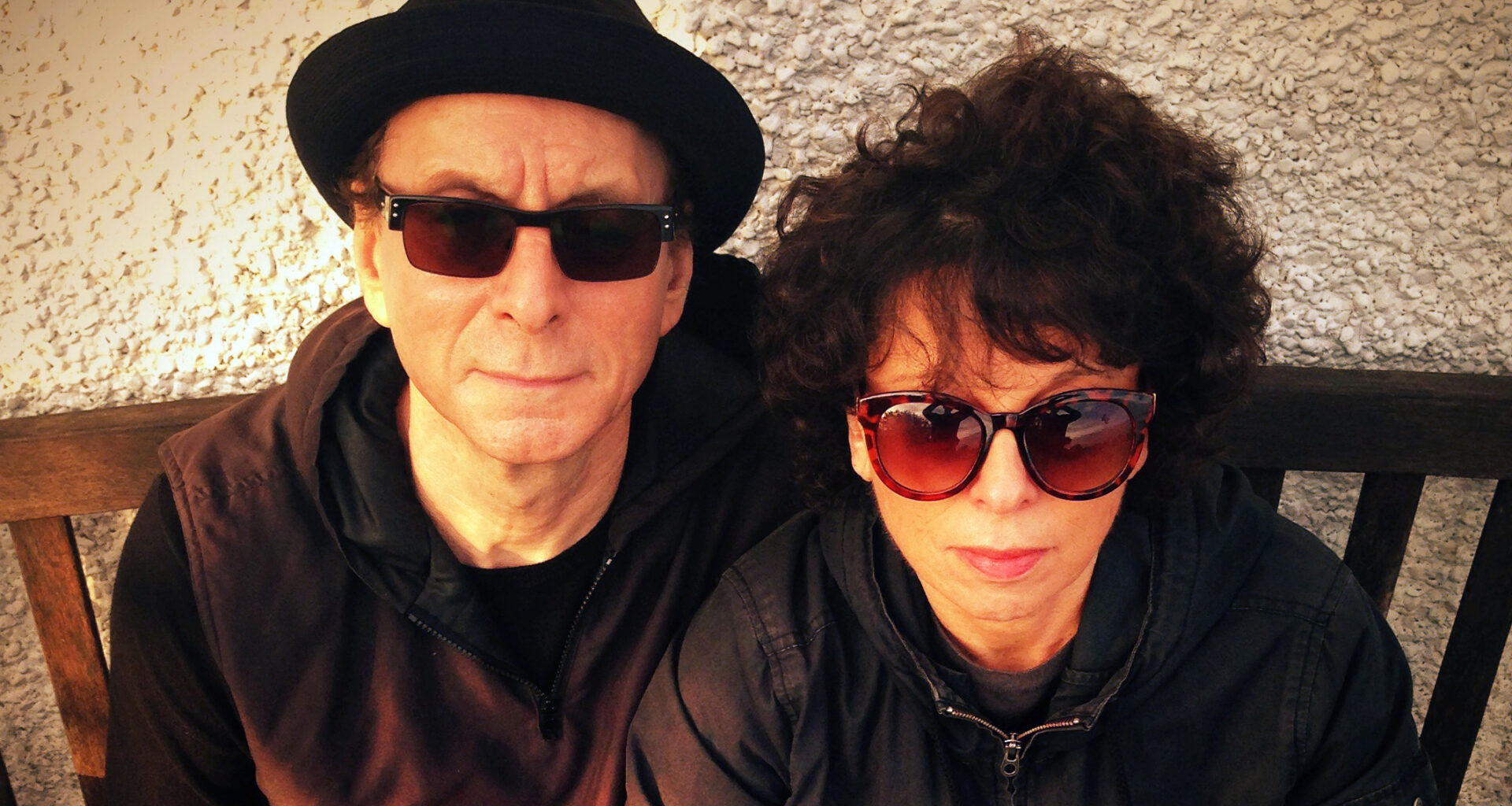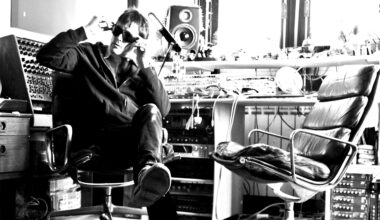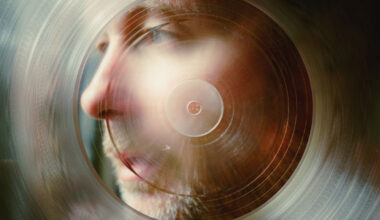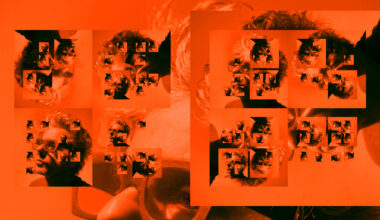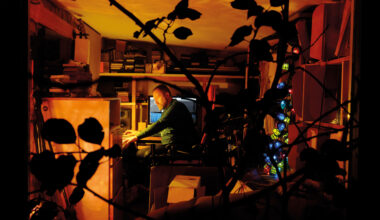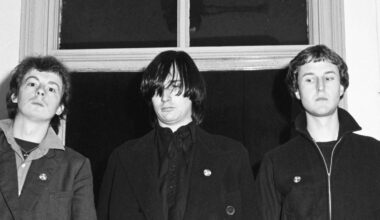A new EP by Immersion finds Wire frontman Colin Newman and Minimal Compact basser Malka Spigel on sparkling form… but then this record has been over a decade and a half in the making
The date is 26 February 2000. The place is London’s Royal Festival Hall. The occasion is the art-punk four-piece Wire reforming as a functioning unit for the first time in a decade. Support comes from a number of artists and associates connected to the group: Mute Records boss Daniel Miller and Seth Hodder slicing up Wire records into an unholy electro-acoustic cacophony as DJxDJ; Wire bassist Graham Lewis performing as He Said; Christian Hausswolf and Leif Elggren delivering their fantastically odd Krev national anthem from the venue’s royal box; the Michael Clark Dance Company.
The first support act on the night is Immersion, the pairing of the irascible Colin Newman, Wire’s nominal frontman, and Minimal Compact bassist Malka Spigel. The pair hunch over electronic equipment, producing a suite of drifting ambient soundscapes while graphics are projected behind them. The images include Newman bearing a placard upon which is scrawled the legend “Everything after ‘Pink Flag’ sucks” in marker pen, an oft-repeated view held by UK punks who couldn’t get their shaven heads around Wire jettisoning punk rock for artier concerns.
Following on from a slew of releases across the 1990s, the Royal Festival Hall appearance would be the last time we’d hear from Immersion… until now.
“I don’t like the word ‘project’ in general,” says Malka Spigel. “I don’t like the idea of anything being a project. It’s just something you do, right?”
Colin Newman nods his head in agreement.
“It’s a thing,” he adds.
Immersion’s backstory theoretically began when Newman met Spigel while producing Minimal Compact’s 1985 album, ‘Raging Souls’. Theirs is both a musical and a real-life partnership, with the pair clocking up three decades as a married couple later this year. But our concern here is the genesis of an electronic music collaboration (the only word that presents itself now that “project” is off the table) that came hot on the heels of the record label they’d established together in 1993.
Like many labels created in the 90s, Swim~ came into existence out of relative necessity, in this case the need to find a home for Spigel’s first solo album, ‘Rosh Ballata’, which Newman had co-written and co-produced. It was long-term Wire fan Daniel Miller, whose Mute Records was responsible for releasing all of Wire’s material in the 1980s, who suggested the pair set up their own label to put out Spigel’s album in the UK. To their evident surprise, the record sold a few copies and suddently they were the proud owners of a shiny new independent imprint. Spigel came up with the name, just like she usually does with the titles of their songs together, and Mute continued to provide background support. The challenge, as Newman recalls, was that a label needs releases in order to actually function. And at that point Swim~ had just the one.
“We had this other project called Oracle,” says Newman. “We’d been working on that for years with Samy Birnbach from Minimal Compact and it was a vocal record with a strong electronic element. We mixed it pretty soon after we moved to London and then we released that as well. So that gave us two releases on the label, but we didn’t have any other artists. In the end we just thought we’d make up something else between the two of us. That was how Immersion came about.”
“We were very influenced by everything that was going on at the time,” says Spigel of the shimmering electronic music that Immersion represented, coming out as they did during the great dance music boom of the mid-90s.
“It was very much the period of faceless techno bollocks,” chimes in Newman with a wry smile. “We just said, ‘Okay, we have a label, let’s do something electronic’, and so we made what became the first Immersion record, ‘Oscillating’. People seemed to really like it and it sold pretty well in Germany. After that, people started coming to us and saying how much they’d love to remix it. The first person was Robin Rimbaud. Touch Records founder Jon Wozencroft, who was working on the designs for Swim~, suggested we release some 12-inch records and that’s when we started to issue the ‘Immersion Remixes’ series. That’s really how we grew our label.”
The ‘Immersion Remixes’ would see the duo’s tracks re-imagined by the likes of Rimbaud’s Scanner alias, Claude Young, Mick Harris, Paul Schutze and Mark Gage. For a duo whose roots lay well outside the traditional electronic sphere, whatever that is, their ability to attract remixes from individuals who were at that time carving decent niches for themselves in the burgeoning electronica scene was remarkable.
“We met lots of interesting people,” Spigel reminisces. “It was just so easy for people to remix you, for you to remix them, and then to just release everything. It was a great time to be running a label.”
“There were so many people doing these little labels,” says Newman. “You could literally make a record and release it yourself. It could sound produced, but it didn’t have to be done in a really expensive studio. It really was an amazing time. You used to make up your test pressings, give them to the Fat Cat record shop, and they would give them to all the top DJs. That got you into the record boxes of people like Jeff Mills or whoever. In return, of course, they sold all those white labels.”
At this, Newman gives a characteristic and slightly cynical laugh.
Swim~ would go on to issue singles and albums by the likes of G-Man (Gez Varley from LFO’s solo project), Lobe, Dol-lop and Pablo’s Eye, as well as staple listening like Newman’s ‘Bastard’, which leaned much more into the Wire art rock oeuvre, even if it dispensed with his trademark vocals and operated within an electronic framework. The constant, however, was Spigel and Newman’s Immersion thing.
Immersion released three 12-inch remixes as well as two albums and a stray single, each one slightly different from the last. Reflecting the “anything goes” spirit of electronic music in the 1990s, Immersion seemed to be on a perpetual evolution, moving from the deep, submerged pulse of their earliest material through tentative experiments with drum ’n’ bass and on into Eno ambient territory.
“Immersion is a very pure thing,” Spigel offers. “That’s a good way of describing it. The sounds, the way we do it, the whole attitude to it. We just do it. It’s not trying to be anything specific.”
The date is 14 March 2005. The place is London’s Queen Elizabeth Hall. The occasion is krautrock legends Michael Rother and Dieter Möbius performing together as part of the South Bank’s Ether Festival.
Support for the duo comes from They Came From The Stars I Saw Them and the wonderfully-named Githead. Githead is another Colin Newman and Malka Spigel incarnation. The drum stool is occupied by Max Franken, Minimal Compact’s drummer and a man capable of playing the trademark krautrock motorik groove with unswerving dedication.
Halfway through one song, however, everything grinds to an unexpected halt. The guitarist has snapped a string. “I normally use a computer,” he says, evidently embarrassed. Newman hands him one of his own guitars and, after a few witty exchanges, the song starts up again. The guitarist is Robin Rimbaud, who is not known for his work outside of electronica. He’s been a friend of Newman and Spigel since offering to remix Immersion over a decade before.
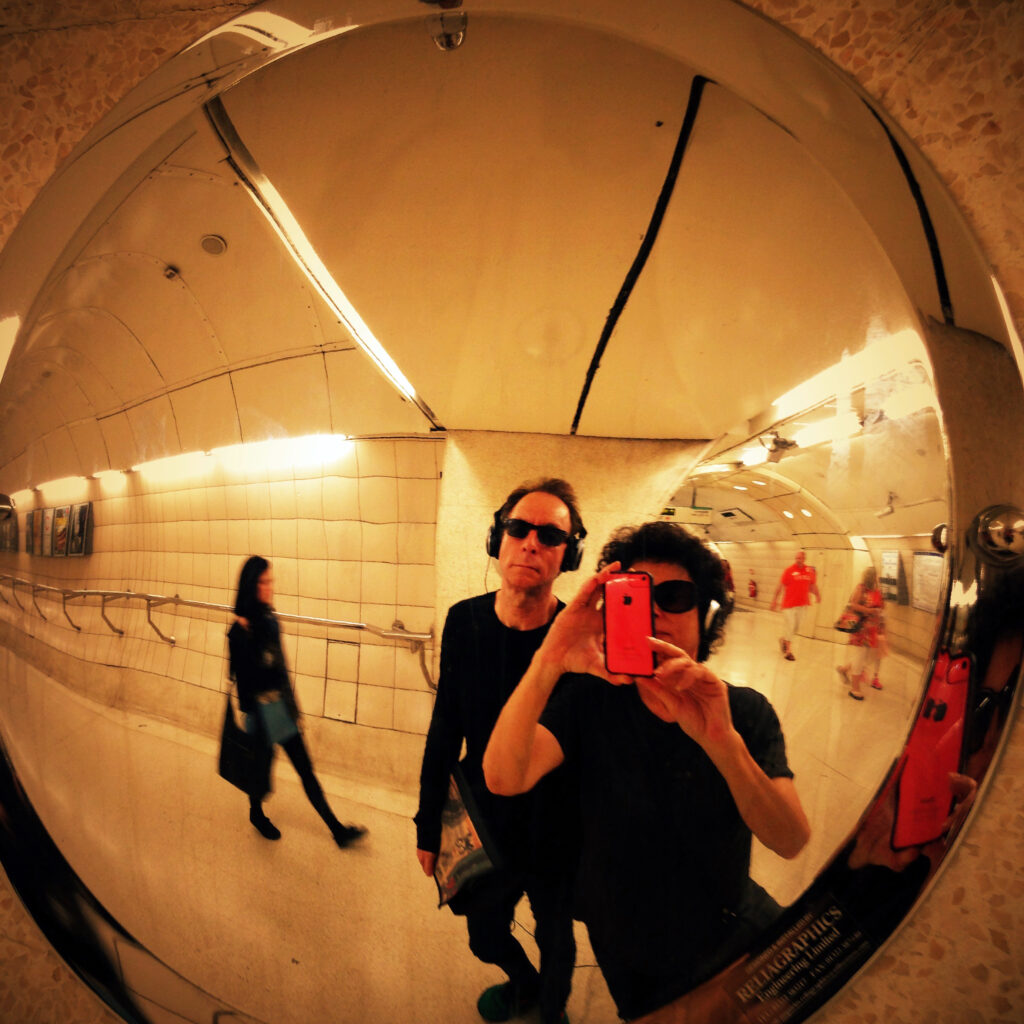
In the 2000s, Colin Newman’s time was broadly split between the rehabilitated Wire and the Githead unit. Whereas Wire continued to evolve their unique strain of art rock, Githead went headlong into a sort of funky krautrock hybrid. Electronics were used sparingly in both groups. Spigel, meanwhile, reformed Minimal Compact for live dates and continued to push the boundaries of rock, funk and punk. Immersion seemed to have sunk without a trace.
“We kind of got into other things,” says Spigel matter-of-factly.
“At that time it felt like it was more natural to be doing things with a group – a guitar, bass and drums kind of thing,” adds Newman casually.
Tel Aviv’s 130 Rock Apartments hotel screams hipsterism. Its rooms are minimal but quirky and, most surprisingly of all, filled with old synths. Newman and Spigel are excitedly showing off a keyboard in their room. You can muck around with it if you feel so inclined.
“It’s very cool,” says Spigel. “When you go in the corridor, it’s full of old gear just piled up everywhere.”
“There are two emulators out there,” adds Newman, gesturing toward the corridor. I suggest they should stick them in their suitcases and take them back to their home in Brighton. Newman shoots me a look that he’d probably last used for the gobbing youths at early Wire gigs.
“They weigh a ton,” he says directly.
The pair are in Tel Aviv for a series of five Minimal Compact shows, with Newman appearing on guitar. Staying in 130 Rock Apartments, with its museum-like collection of abandoned electronic kit, is suitably appropriate, as we find the duo on the cusp of releasing the first Immersion material since the late 1990s, a 10-inch single called ‘Analogue Creatures’.
“It was either December 2013 or December 2014 that we felt like we needed to do something,” says Newman about the conception of Immersion’s return.
“It’s just so easy to do that,” Spigel continues. “You know, you don’t have to plan for it. You just go into the studio and start playing and working together on something quite loose. It’s not songwriting. It’s just music.”
Conceptually, ‘Analogue Creatures’ circles back round to the spacey electronica of Immersion’s first releases, but equally draws from the evocative krautrockian guitar textures that had become a staple of their Githead tracks.
“It’s all just layers,” explains Newman. “One of us starts with something and we just build on top of that. It’s not like the layers are all linear, four-bar loops; they could be anything. Immersion starts in a different place to Githead. Maybe the harmonies are pretty common to other things we’ve done, but we might end up at different things. In the past, Immersion was more sparse. We made it a little bit more harmonic this time around, or perhaps a bit harmonically fuller.”
Newman pauses, reflecting.
“It just feels like that’s how it should be. There’s nothing that’s thought about in any planned way with Immersion. It just is. It’s the sound of me and Malka fiddling about in the studio.”
If there’s one constant feature across Newman and Spigel’s projects, it’s the Korg MS-10, which the duo have used repeatedly over the years. That affection for analogue synths is what, at least in part, gave Immersion’s new five-track EP its resonating title.
“To me, synths have an organic quality,” muses Spigel. “I think they sound like creatures. The MS-10 has a creature quality. It’s like a living thing with its own will and its own personality, and that’s how we got to the title. We just play with names. It doesn’t necessarily have to have a huge meaning behind it.”
“It’s got analogue elements and it’s got digital things taking place on it,” adds Newman. “Analogue doesn’t really refer to the equipment. It’s more like a machine-human kind of thing.”
When I suggest that the duo seem to be contemplating some sort of awful, dystopian human cyborg future, Newman laughs.
“Not really,” he says. “The MS-10 is kind of wonky. You don’t quite get out of it what you put into it.”
“Or you never know what you’re going to get!” adds Spigel.
“It’s completely instinctive,” says Newman. “It becomes an extension of yourself. Like a creature.”
Instinctive is a good way to describe Malka Spigel and how she approaches things.
“Malka sees herself as someone who is both a musician and a visual artist,” explains Newman. “But both things are done in exactly the same way, at exactly the same level. It’s not like, ‘Here is my art side’ and ‘Here is my musical side’. The way she approaches both is exactly the same and I admire her for that. It’s very free-flowing.”
“Which means you do it when you do it,” adds Spigel. “There’s nothing going on before that second when you start doing it. There’s no thinking going into it. You just use your instinct to know which bit is good.”
One possible trigger for Newman and Spigel returning to Immersion is their relocation from London to Brighton a few years ago and becoming aware of the seaside town’s ultra-hip underground electronica scene. That scene is partly focused around [beep], an electronic music club that takes over The Verdict, nominally a jazz venue, a few streets from Brighton’s esplanade. Newman stresses that [beep] is a club in the sense of something you join rather than somewhere you go to dance.
“It’s fairly random,” says Newman. “They bring their own PA and you have different people just turning up and doing stuff. Since we’ve moved to Brighton, we’ve come to know quite a lot of people who are connected to electronic music in some way.”
One of the scene’s protagonists is Guy Schneerson, who the duo worked with on ‘Organic Cities’ from the new EP.
“He has this very cool four-voice analogue synthesiser called a Vermona,” says Newman. “We played an arpeggio chord of E minor with that and it just sounded so nice, so that made the basis of one track. He also had a drum synth that emulates drum sounds, but we destroyed the drum sounds out of it so it didn’t sound like drums anymore.”
Beats are noticeably absent from the five tracks on ‘Analogue Creatures’, although there is a discernible pulse throughout.
“We’ve moved into this sort of beatless thing with Immersion and I kind of like that. I mean, I like working with rhythms, but rhythms don’t necessarily need to involve drums.”
As well as their engagement with Brighton’s electronic scene, Spigel cites the band Moon Duo, whose deployment of synths and guitars in such a way as to make it unclear where one starts and one stops is clearly evoked in the dense layering of ‘Analogue Creatures’. For Newman, an influence came from his Wire bandmate Matt Simms’ work under the name Slows, whose 2015 10-inch EP of Farfisa and found sound collages, had a bearing on both the new Immersion music as well as the decision to release their record on vinyl.
True to the idea of Immersion being something that Colin Newman and Malka Spigel can just dip in and out of whenever they feel like it, the duo have no concrete plans to do anything else with this not-project right now. Another EP or a full album aren’t remotely on the horizon. The only thing they are contemplating is developing a live performance.
“Nowadays, playing live is so important,” says Spigel. “Right now, we’re thinking of how to do it, what gear to use. It’s not like when you play a rhythm on the bass or guitar; it’s something totally different.”
“We’d have to figure out how we did it in the first place,” laughs Newman. “I wouldn’t want it to be like it was made out of a load of bits and there would definitely be no computers. There must be a way that we can combine two or three instruments, just literally mic-ing something on the spot, and then that can go with other pieces that have elements of things we’ve done before. It needs to be something that operates on a very, very simple level.”
However it comes about, and whatever it eventually sounds like, Immersion will always be characterised by a instinctual, spontaneous dimension. Whenever Newman and Spigel decide it’s time to float Immersion to the surface again, it is certain to come with the same enthusiasm for deep electronic exploration that’s been evident across the entire history of this stop-start project, collaboration, thing, or whatever they would have us call it.
‘Analogue Creatures’ is out on Swim~
